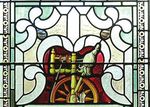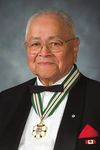BCTI Alumni NEWS - Legislative Assembly of British Columbia
←
→
Page content transcription
If your browser does not render page correctly, please read the page content below
BCTI Alumni NEWS issue 1 | volume 20 | January 2019
Tour Program Updates
Little Legislators
Little Legislators is a free school tour program aimed at younger, more kinesthetic
learners, and is best suited to students K-3. Offered in English or French, the program
covers concepts of identity and family, community participation, and indigenous
peoples. Participants will be introduced to the foundations of debate, law-making,
and provincial governance. Through a mock-debate, students can learn how groups of
people come together to make the decisions, and how to make their voices heard.
Parliamentary Players Program
The Legislative Assembly of BC is offering guided tours with the longest serving MLA,
Thomas Uphill. Mr. Uphill will regale visitors with stories of his 40 years serving in the
Chamber, giving an in-depth look at the parliamentary process, and what it means to
be a legislator. Public guided tours with Mr. Uphill will be offered every Friday until April
26th, 2019.
Spring Break Program
Join us for Spring Break at the Legislature! During this free, 1.5 hour program, you will
be guided through the Parliament Buildings, exploring art and architecture, the history
of British Columbia, and BC’s parliamentary system of governance. Hands-on and
engaging, this program is best suited to families with children aged 5 -12.
For more information, please email tours@leg.bc.ca or call (250) 387-1771.
IN THIS Tour Program Updates • New Lesson Plans • Democracy Bootcamp: Get ready for the 2019 federal election
Having a Voice: Voting Rights and Democracy in British Columbia • Parliamentary Trivia • Electoral Milestones in 2019
ISSUENew Lesson Plans
The four lesson plans created by
your colleagues during our most
recent B.C. Teachers’ Institute on
Parliamentary Democracy are now
available online!
Grade 3 - 6:
Creating a Budget: Who Wants
Pie?
Grade 4 - 10:
Don’t Hate Debate: How Democracy Bootcamp:
Decisions Are Made
Get ready for the 2019 federal election!
Grade 5 - 10:
Analyzing Political Campaigns In February, CIVIX will bring together 125 teachers from throughout British Columbia for
Analyser les campagnes Democracy Bootcamp to prepare for the October 2019 federal election.
politiques
The event will feature experts and journalists sharing their insights on politics and the campaign
Grade 10: ahead, as well as presentations and small group discussions to speak about useful tools and best
practices for the Student Vote program.
RIDing the Court
The event will also focus on the threat of mis- and disinformation on democracy and rethinking
Interested in seeing other lesson news literacy skills in the digital age. Civix’s team will review the tips and tricks for fact-checking
plans? Simply visit our Learning and verifying sources that you can bring back to the classroom.
Resources page.
The event will take place in downtown Vancouver on the evening of Thursday, February 21
(6:00 pm to 8:30 pm, with reception to follow) and during the day on Friday, February 22 (8:00
am to 3:00 pm).
CIVIX will cover transportation costs (if outside Metro Vancouver), shared accommodation (with
private accommodation available for $115) and meals at the event. TOC costs will also be covered
for those who require it.
This event is being financially supported by Elections BC and Elections Canada.
For more information, visit https://democracy-bootcamp-bc-2019.eventbrite.ca or call toll-
free, 1-866-488-8775.BCTI Alumni NEWS issue 1 | volume 20 | January 2019
Parliamentary
Trivia
Having a Voice: Voting Rights and Democracy in British Columbia
Learn about governance using the Royal BC Museum’s newest outreach kit
No matter where your classroom is, you can engage with the Royal BC Museum through their outreach kits. The
newest kit to join the roster, Having a Voice: Voting Rights and Democracy in British Columbia, was created in
partnership with Elections BC. Having a Voice is designed to fit the Grade 5 Social Studies: Canadian Issues and In British Columbia
Governance curriculum. Through activities suggested in the educator’s guide and using their own inquiry process skills, today, there are 87
participants will explore engagement and representation in BC politics, the electoral process and electoral boundaries. Members of the
Legislative Assembly
The Having a Voice outreach kit provides your class with a (MLAs) representing
unique opportunity to look closely at primary sources, the 87 electoral districts.
core material for understanding our past. The kit includes However, when BC
primary-source documents and reproduction items from the first became a province
Royal British Columbia Museum, Elections BC and the BC
there were only 25
Archives. Examining these documents will allow participants
to gain new perspectives on how governance, democracy MLAs.
and voting rights have changed in this province.
Q. How many electoral
Thanks to the partnership with Elections BC, the kit is districts did those 25
available for two-week loan periods at no cost - including MLAs represent in
shipping! 1871?
Near or far, visit the Royal BC Museum website to book
A. 25
or learn more about using outreach kits for use in your
classroom.
B. 12
C. 10
By Kate Adams, Learning Program Producer at RBCM
Email your answer to
PEO@leg.bc.ca to win a
prize pack from the gift
shop.BCTI Alumni
NEWS
issue 1 | volume 20 | January 2019
Electoral Milestones in 2019
This year marks the 70th anniversary of two important milestones in British Columbia’s electoral history.
In 1949, the Legislative Assembly enfranchised Canadians of Japanese descent and the Indigenous people of British Columbia by removing voting
prohibitions that had been in place since 1895 and 1874, respectively. This came shortly after similar restrictions were lifted for Canadians of Chinese
and Indian ancestry (1947), as well as Hutterites and Mennonites (1948). Universal suffrage for all people in British Columbia would finally be
achieved in 1952, when restrictions against Doukhobors were removed.
It was also in 1949 that Frank Calder, a hereditary chief of the Nisga’a nation, was elected to the Legislative Assembly of British Columbia. He was
the first Indigenous person elected to serve in any Legislative Assembly in Canada and later became the first Indigenous Member of Cabinet. He was
re-elected as the MLA for Atlin eight times (serving 1949 – 1956 and 1960 – 1979) before being defeated by only a single vote in the election of
1979. Today, Frank Calder is probably best known for his role in the Supreme Court of Canada decision that bears his name and that established, for
the first time, that Aboriginal Title exists in modern Canadian law.
While the prohibition against Japanese-Canadians was also removed in 1949, it would be another 60 years before the first Canadian of Japanese
ancestry was elected to the Legislative Assembly. Naomi Yamamoto, whose father was interned at Lemon Creek, British Columbia during the Second
World War, ran successfully as the candidate for the riding of North Vancouver-Lonsdale in the provincial general election of 2009.
By David Nicholls, Parliamentary Education Officer at the Legislative Assembly of BC
@BCLegislature
Do you have a story your fellow To update your contact info or
BCTI Alumni might be interested in? @BCLegislature to unsubscribe to this newsletter,
Email: PEO@leg.bc.ca email: PEO@leg.bc.ca
Legislative Assembly of BCYou can also read
























































